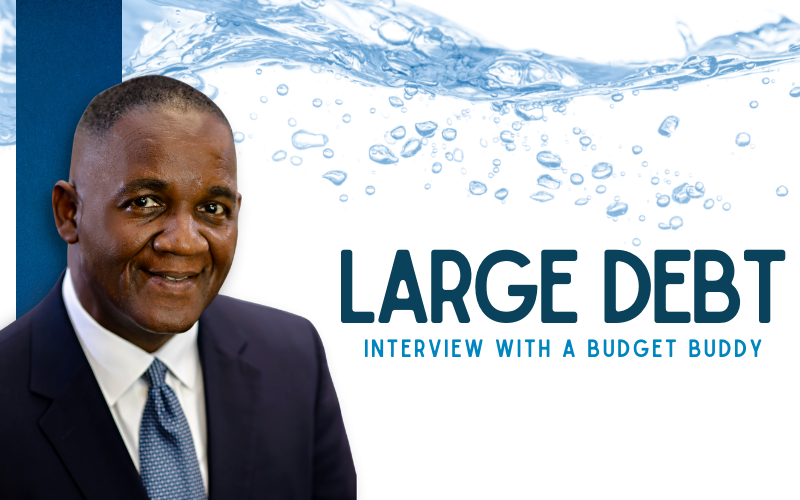Blog | Dealing with Large Debt Loads – An Interview with a Budget Buddy
Hello, my name is Clarence Nash. You might recognize me from my various roles within Resource One since 2002. Additionally, I have been a Certified Financial Counselor and Credit Union Development Educator since 2018.
These influences and experiences are the foundation of my belief that every individual has the potential to find value in themselves and others through applied learning and discipline, both socially and economically.
Today, I will be addressing questions you might have about large debt. However, if you are interested in more information or a personalized evaluation of your specific situation, you can reach out to me or any of our other qualified Budget Buddies. This service is free to our members to help them get on the right financial foot.
Can I inherit debt if someone dies?
Some laws protect people from inheriting debt, but that may vary depending on what state you reside in. For example, if you live in a community property state, debt incurred during a marriage may be considered joint, and thus you may have some liability. Conversely, if you’re not in a community property state and you weren’t a cosigner or joint account holder, you shouldn’t inherit things like credit card debt. Keep in mind that, as a rule, a person’s debts do not go away when they die. Typically, those debts are owed and paid from the deceased’s estate.
Can I wait out a debt? Does debt disappear out after a certain amount of time?
Great question! So, depending on the type of debt and what state you live in, you may be able to wait out debt, but it depends on the statute of limitations where the debt was incurred. Most negative debt should automatically fall off your credit report after seven years. Still, the damage to your credit report and purchasing power may exceed the cost of negotiating pay downs, as bad credit will inevitably make any future financing more costly. “An ounce of prevention is worth a pound of cure”.
It’s a good idea to always figure your way out the back door before going in the front door. In other words, have a plan to liquidate debt before getting into it. Then, consult a financial counselor or budget buddy if you sense trouble on the horizon.
When should I consider bankruptcy?
As we know, bankruptcy laws were designed to prevent economic enslavement and protect the rights of people in financial hardships. Filing for bankruptcy in a court of law typically stops all collection activity and legal proceedings. You should consider declaring bankruptcy if you have large debts that you can’t repay, especially if you are behind on your mortgage and in danger of foreclosure.
In some cases, bankruptcy can reduce or eliminate your debts and keep the bill collectors at bay, but it also has serious consequences, including damage to your credit score. Subsequently, it can hamper your ability to borrow in the future and raise rates on your most basic needs, such as insurance. It may also affect your ability to get a job. Making wise decisions, even seeking counseling from your local credit union, can mitigate the possibility of bankruptcy considerations.
Is bankruptcy a clean slate?
Not really. When you file for bankruptcy, your slate is clean only to ensure that you are no longer liable to creditors for most debts.
The bankruptcy will remain on a Chapter 7 debtor’s credit record for up to 10 years. There are at least four types of bankruptcy, depending on whether you’re filing as an individual or business and filing for liquidation or reorganization; all have future consequences.
What can be taken from me if I don’t pay off a debt? Can my household items be repossessed to pay off a debt?
Under the bankruptcy codes, the bankruptcy courts will classify your assets as either non-exempt or exempt. In most cases, you do not risk losing household items, but that could vary according to the state you live in and the federal laws. However, things like a second home, cars, artwork, jewelry, etc., may be considered non-exempt assets and subject to a loss risk.
Obtaining clarity from legal consultations are always good advice, but keep in mind that it’s equally as expensive.
How do I start working my way out of this situation when I can’t catch up on payments?
If you are having trouble maintaining your financial obligations, there are a few mitigating things that you may consider before filing for bankruptcy. The first step I would consider is contacting the creditor and or debt collector to see if it would be possible to negotiate a settlement amount. Payment reduction terms and interest rate adjustments may also be available to help you through your crisis.
Being realistic about what you can and cannot afford to do helps establish a game plan for debt liquidation and elimination. Remember, when you’re talking with them, let them know that if you lose, that makes them losers too. Have a budget, and stick with it.
Are you ready to meet up and discuss your questions in-depth or didn’t find the answer you are looking for? Our Budget Buddies can look at your situation and provide you with a more personalized response. The more we know about your situation, the better we can help.






